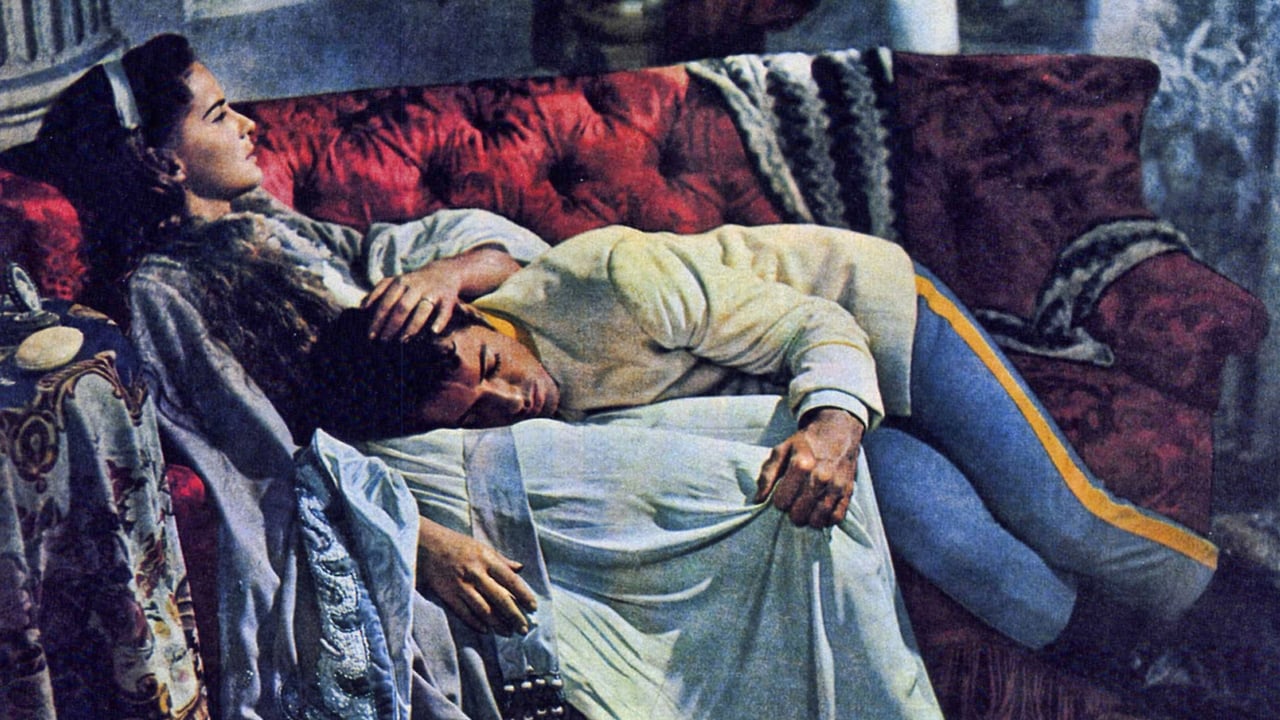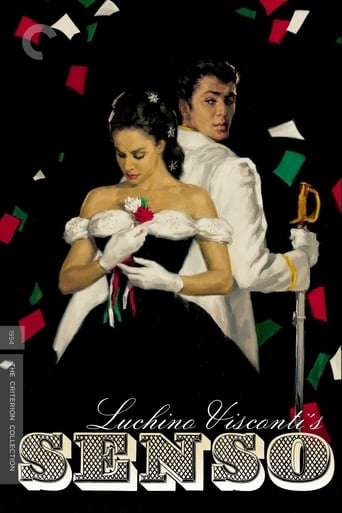

Luchino Visconti was first of all an opera director, and this was his most opera-like film. Another opera director, Franco Zeffirelli, was one of the co-directors with Francesco Rosi. The film actually begins with an opera performance at the Phoenix Theatre in Venice 1866 with the dramatic climax of Verdi's "Il trovatore", which sets the film flourishing from the start - the opening scenes are cinematographically the best of the whole film, but the realism is absolute all the way in every detail and just worth seeing over and over again for that. At the same time, it's a typical Visconti film, unmasking every human illusion on the way down the abyss of human self-deceit, self-degradation and decay. You can't really sympathize with any of the two leading characters, as they both lose control completely almost from the very beginning and don't hesitate to at every possible moment making it worse. The consequential outrageously brutal reality is horrendously shocking in its totally unemotional outcome. But the players are excellent, and it's no easy parts they are playing. To this comes the gorgeous use of Bruckner's music, particularly his seventh symphony, the second movement, and I don't think Bruckner's music has been used in any other film. Here it is the more perfect, sumptuously illustrating the opera-like melodrama by adding weight and pathos to the doomed romance. This would have been Visconti's most accomplished masterpiece, if he hadn't ten years later made the even finer "The Leopard".
... View More"Sanso" looks nice. It has a nice, sweeping look to it and if the color print received a bit of conservation (cleaning up the print a bit and sharpening it as well), it would be a gorgeous movie. But, it's also a great example of a film which suffers because the main characters are complete moral degenerates and are therefore difficult to relate to or care for during the course of the movie.This film is set around the time of the Italian independence movement in the late 1860s and into the early 1870s. The Italians, long dominated and ruled by outsiders, are uniting under Garibaldi and are trying to gain self-rule. In the midst of this is a terribly confusing Countess (Alida Valli). On one hand, she supports the independence movement through her cousin and his efforts. Yet, completely inexplicably, she falls for an Austrian officer--who is her sworn enemy. It seems that despite being on opposite sides, they have a common love...him. So, in essence, her ideals mean nothing and she's willing to throw away her opulent life with the Count and her country for some Germanic stud. In fact, at one point, she makes herself a traitor by giving the lover money which was gathered to support the Italian army...and all for love (or at least what this whore thinks is love).While many reviewers seemed to like this film, I couldn't get past the characters. While there was no obvious reason for the lovers to be together, they were. And, because they were both selfish and nasty, you really don't care what happens to them. After all, she's an adulteress, thief and a traitor. He's a coward, cheats on his new lover and is a deserter. Sounds like a relationship made in heaven, right?!The bottom line is that no matter how good the film looks and how well it's acted, it's just about some boorish jerks--and that makes it a film I could have just as soon skipped.
... View MoreIn 1866, in the spring of Venice, an underground rebel movement against the Austrian occupation in Italy is getting stronger. The married Countess Livia Serpieri (Alida Valli) sees her cousin challenging the Austrian Lieutenant Franz Mahler (Farley Granger) for a duel in the opera and being arrested and sent to the exile for one year. When she meets Mahler, she first hates him but after a night together walking along the streets in Venice, she falls deeply in love for him, becoming his mistress. When the war starts, she moves to her property in the country missing Mahler. When he visits her during a night, she forgets her principles, decency and betrayals her cause with cruel and tragic consequences.I am one of the greatest worldwide fans of IMDb, but sometimes I am disappointed with the ranking of this site. How can a masterpiece like "Senso" be out of any worldwide serious list of the top 250 best movies? The "red noble" Luchino Visconti is one of the best directors ever and this masterpiece explores a wonderful, cruel and tragic romance in times of the Italian "El Risorgimento". Each scene in this movie looks like a picture of the XIX Century, full of details. The cinematography is one of the most beautiful I have ever seen, with a stunning recreation of a period. The story is fantastic, with a gorgeous Alida Valli in the top of her beauty, and Farley Granger splendid as a scum lover. The restored DVD released in Brasil by Versatil distributor is amazing, full of excellent extras. My vote is ten.Title (Brazil): "Senso Sedução da Carne" ("Senso Seduction of the Flesh")
... View MoreI have rated this film 9 because of it's length, there are some ponderous moments, but otherwise it is a 10. Italian cinema was still having growing pains from the war, but this epic succeeds, and skillfully incorporates the war torn landscape into this tale of an earlier war. The music score is very big and melodramatic, but fitting. The film opens with an opera in an enormous opera house, and this is fitting for the grand scale and operatic scope of this romance and the background. This is "Gone With the Wind" - Italian style - with a much more sympathetic heroine.I am a fan of Alida Valli and have sought out her work. Perhaps because this is in her native Italian, and/or because of her Italian director, she is a full, vital, feminine woman in this film; very different from her more restrained work in America. (Her breathtaking performance in "The Paradine Case" is a study in austerity and an almost masculine stillness.) I had hoped that we would see a more free actress in her native language, and we do! She flutters and tosses her hair, she is a Countess reveling in her earthy affair. This is a full bodied performance.Farley Granger's performance, whether in response to Valli, or just given a really meaty bad-boy to play, is a total revelation. He is lusty and sexy, provocative, pouty and passionate. In one scene, he greets her by wordlessly grabbing her hand and almost devouring it with kisses. This is a rare film where both the woman AND the man have real powerhouse roles. The confrontation scene at the end is gripping.A small but pivotal role is played by Marcella Mariani. Her cow-like leadenness, laced with sisterhood, bespeaks a worldliness that, paired with her ethereal youthful beauty is just wrenching. All supporting roles, especially the maids, are interesting and give a sense of intrigue throughout.A previous reviewer mentioned that the outcome of a major plot point is cut out, which leaves you wondering... "but what happened with that?" Still, the major story is the romance, which I think will be satisfying for men as well as women, because both sides are given such full emotional life. IF YOU CAN FIND IT, it is an enjoyable, big emotion, epic wartime romance.
... View More